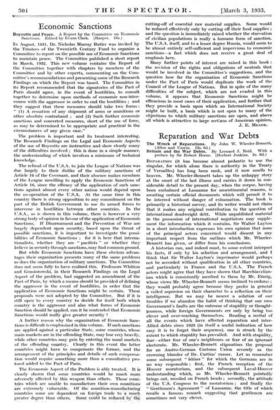Economic Sanctions
Boycotts and Peace. A Report by the Committee on Economic Sanctions. Edited by Evans Clark. (Harper. 16s.) IN August, 1931, Dr. Nicholas Murray Butler was invited by the Trustees of the Twentieth Century Fund to organize a Committee to report on the possible use of Economic Sanctions to maintain peace. The Conunittee published a short report in March, 1932. This new volume contains the Report of the Committee together with chapters by members of the Committee and by other experts, commenting on the Com- mittee's recommendations and presenting some of the Research Findings on which the Report was based. The Committee in its Report recommended that the signatories of the Pact of Paris should agree, in the event of hostilities, to consult together to determine upon methods of economic non-inter- course with the aggressor in order to end the hostilities ; and they suggest that these measures should take two forms : " (1) A cessation of any shipment of arms or munitions or other absolute contraband ; and (2) Such further economic sanctions and concerted measures, short of the use of force, as may be determined to be appropriate and practical in the circumstances of any given case."
The problem is important and its treatment interesting. The Research Findings on the Legal and Economic Aspects of the use of Boycotts are instructive and show clearly many of the difficulties involved ; this is done in a simple manner, the understanding of which involves a minimum of technical knowledge.
The refusal of the U.S.A. to join the League of Nations was due largely to their dislike of the military sanctions of Article 16 of the Covenant, and their absence makes members of the League unwilling to apply the Economic Sanctions of Article 16, since the efficacy of the application of such sanc- tions against almost every other nation would depend upon the co-operation of the U.S.A. At the same time in this country there is strong opposition to any commitment on the part of the British Government to use its armed forces to intervene in hostilities between other countries. In the U.S.A., as is shown in this volume, there is however a very strong body of opinion in favour of the application of Economic Sanctions. If Disarmament and the Prevention of War are largely dependent upon security, based upon the threat of possible sanctions, it is important to investigate the possi- bilities of Economic Sanctions ; for it is here that interna- tionalists, whether they are " pacifists " or whether they believe in security through sanctions, may find common ground.
But while Economic Sanctions have these obvious advan- tages their organization presents many of the same problems as does the organization of military sanctions. The Committee does not seem fully to have realized this. Professors Whitton and Gonsiorowski, in their Research Findings on the Legal Aspect of the problem, had suggested an amendment of the Pact of Paris, by which a means should be provided of defining the aggressor in the event of hostilities, in order that the application of Economic Sanctions might be certain. These propitsals were not adopted by the Committee. But if it is still open to every country to decide for itself both which country is the aggressor and also what forms of Economic Sanction should be applied, can it be contended that Economic Sanctions would really give greater security ?
A further reason why the organization of Economic Sanc- tions is difficult is emphasized in this volume. If such sanctions are applied against a particular State, some countries, whose main markets are in the offending State, may lose very heavily, while other countries may gain by entering the usual markets of the offending country. Clearly in this event the latter countries might have to compensate the former, and the arrangement of the principles and details of such compensa- tion would require something more than a consultative pro- tocol added to the Pact of Paris.
The Economic Aspect of the Problem is ably treated. It is clearly shown that some countries would be mtich. more adversely affected by this weapon than _others. Those coun- tries which are unable to manufacture their own munitions are extremely vulnerable. Of the munition-manufacturing countries some are dependent on foreign trade to a much greater degree than others. Some ettalld be reduced by
cutting-off of essential raw material supplies. Some would be reduced effectively only by cutting off their food supplies ; and the question is immediately raised whether the starvation of civilian populations is really a humane form of sanction. The U.S.A. itself, and to a lesser degree Russia, would seem to be almost entirely self-sufficient and impervious to economic sanctions—a fact which does not receive a great deal of emphasis here.
Many further points of interest are raised in this book : the revision of the rights and obligations of neutrals that would be involved in the Committee's suggestions, and the question how far the organization of Economic Sanctions under the Pact of Paris would duplicate the work of the Council of the League of Nations. But in spite of the many difficulties of the subject, which are not evaded in this volume, it appears that Economic Sanctions might be efficacious in most cases of their application, and further that they provide a basis upon which an International Society might be built, a basis which is not open to many of the objections to which military sanctions are open, and above all which is attractive to large sections of American opinion.
J. E. MEADE.


















































 Previous page
Previous page